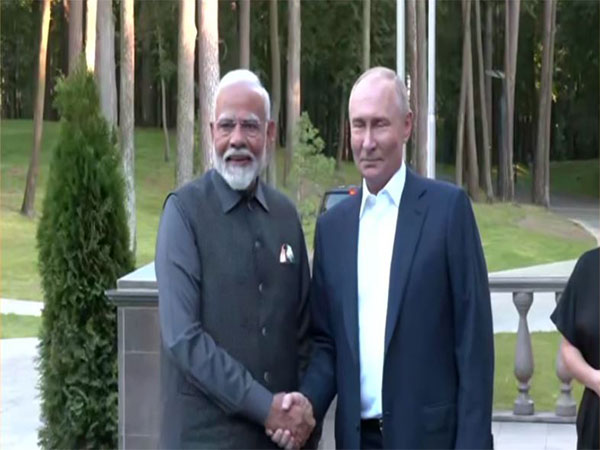New Delhi: Indian Prime Minister Narendra Modi, made an official visit to the Russian Federation for the 22nd India-Russia Annual Summit.
This summit serves as the most significant institutionalized dialogue mechanism in the strategic partnership between the two countries, with 22 Annual Summits having been held in India and Russia. The last Summit was held on December 6, 2021 in New Delhi where 28 Memorandum of Understanding (MoUs) and agreements were signed.
During the visit, President Vladimir Putin conferred Russia's highest civilian honour the "Order of Saint Andrew the Apostle" on Honorable Prime Minister Narendra Modi for his distinguished appreciation to the development of Special and Privileged Strategic Partnership between India and Russia and friendly relations between the peoples of the two countries.
Moreever, they reviewed the whole range of bilateral issues, including defense, trade links, investment ties, energy cooperation, education, culture, and people-to-people exchanges
Historically, India and USSR established formal diplomatic relations in 1947. The year 1955 was key for India-USSR relations, with then Hon'ble Prime Minister Shri Jawaharlal Nehru visiting Moscow in June 1955 and a reciprocal visit by Russian counterpart in November 1955.
These two visits set the pace of the relations for the coming times. Their relationship was broadly built on four pillars including strategic partnership, economic relationship, defense cooperation and cooperation in science and technology.
The strategic partnership led to the signing of the Treaty of Peace, Friendship and Cooperation in 1971. The economic relationship between India and the Soviet Union flourished, with bilateral trade increasing significantly. India's defense cooperation with Russia was further solidified as it acquired most of its defense equipment from Russia.
Furthermore, the Science and Technology Agreement of 1972 paved the way for collaboration in science and technology, culminating in the implementation of the Integrated Long-Term Program of Cooperation in 1987.
The signing of Declaration of India-Russia Strategic partnership in 2000 enhanced the levels of cooperation in almost all areas of the bilateral relationship. In 2010, the Strategic Partnership was elevated to the level of a “Special and Privileged Strategic Partnership” further reinforcing the ties between the two countries.
Since then, the trade between both the countries has accelerated from USD 5 billion in 2010-11 to USD 65 billion in 2023-24. The exports have doubled from around USD 2 billion in 2010-11 to more USD 4 billion in 2023-24. While the imports have picked up significantly from USD 3.6 billion in 20101-11 to USD 61 billion in 2023-24.
India's primary basket of exports to Russia include nuclear reactors, pharmaceutical products, electrical machinery and equipment, organic chemicals and iron and steel, among others
while major commodities of import include mineral fuels, mineral oils, fertilisers, animal or vegetable fats and oils, natural or cultured pearls and project goods, among others.
Given the strong trajectory of trade and economic partnership, the leaders set the target to achieve bilateral trade of USD 100 billion by 2030.Further, they decided to hold next session of India-Russia Intergovernmental Commission on Trade, Economic, Scientific, Technical and Cultural Cooperation (IRIGC-TEC) in the second half of 2024 in Russia.
To accelerate the trade trajectory, industrial collaboration, technological and investment alliances and negotiations for a bilateral free-trade agreement focusing on services and investments and establishment of the Eurasian Economic Union-India Free Trade Area were emphasized.
The discussions were held to intensify connectivity between two countries using the International North South Trade Corridor (INSTC) route which will help in reducing the time and cost of cargo transportation.
To strengthen the strategic partnership, cooperation in the peaceful uses of nuclear energy and space were reiterated. The importance of education, science and technology cooperation was highlighted to enhance and expand bilateral educational and scientific relations.
In addition, they agreed to work together in the framework of the Roadmap for Science, Technology & Innovation Cooperation of 2021 to promote innovation-related collaborations between the two countries, and focus on commercialization of technologies and full-cycle support to joint projects for economic and societal impact.
Both sides agreed to explore the creation of International centers for Innovative Entrepreneurship & Inter-Cluster Interactions to improve Technology Partnerships. They identified potential areas of cooperation as agriculture and food science and technology, ship building and repair, blue economy, marine industry and ocean resources, polar research and nanotechnology, among others.
The summit led to the signing of many MoUs and cooperation agreements in various areas of cooperation including MoUs on climate change, MoUs exchange of knowledge and experience in geodesy, cartography and spatial data infrastructure, MoUs to study the polar environments, MoUs in the field of broadcasting , MoUs in pharmacy sector, MoUs for promotion of bilateral trade, cooperation Agreement between the Indian International Arbitration Center and International Commercial Arbitration Court at the Chamber of Commerce and Industry of the Russian Federation and Agreement between Invest India and JSC "Management Company of Russian Direct Investment Fund to foster investment cooperation.
Narendra Modi's visit to the Russian Federation for the 22nd India-Russia Annual Summit has reaffirmed the robust and multifaceted partnership between the two nations. The summit highlighted the historic and evolving relationship that has spanned decades, marked by strategic, economic, defense, and technological collaborations.
The two leaders also emphasized enhancing connectivity through the International North-South Trade Corridor (INSTC), strengthening cooperation in nuclear energy and space, and promoting educational and scientific ties. With the target set to achieve bilateral trade of USD 100 billion by 2030, the emphasis On industrial cooperation, technological and investment alliances, and negotiations for a bilateral free-trade agreement, the future of India-Russia relations appears promising.
